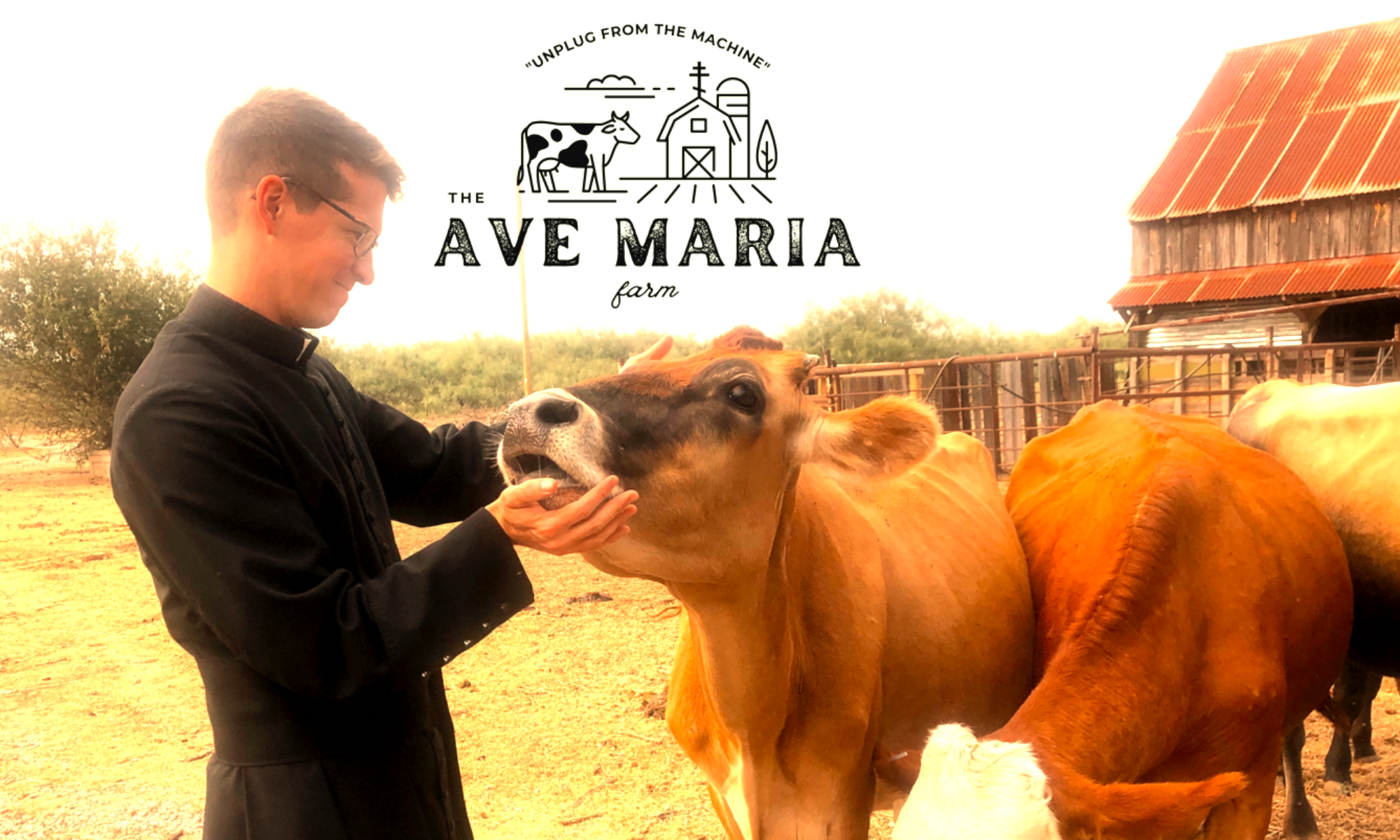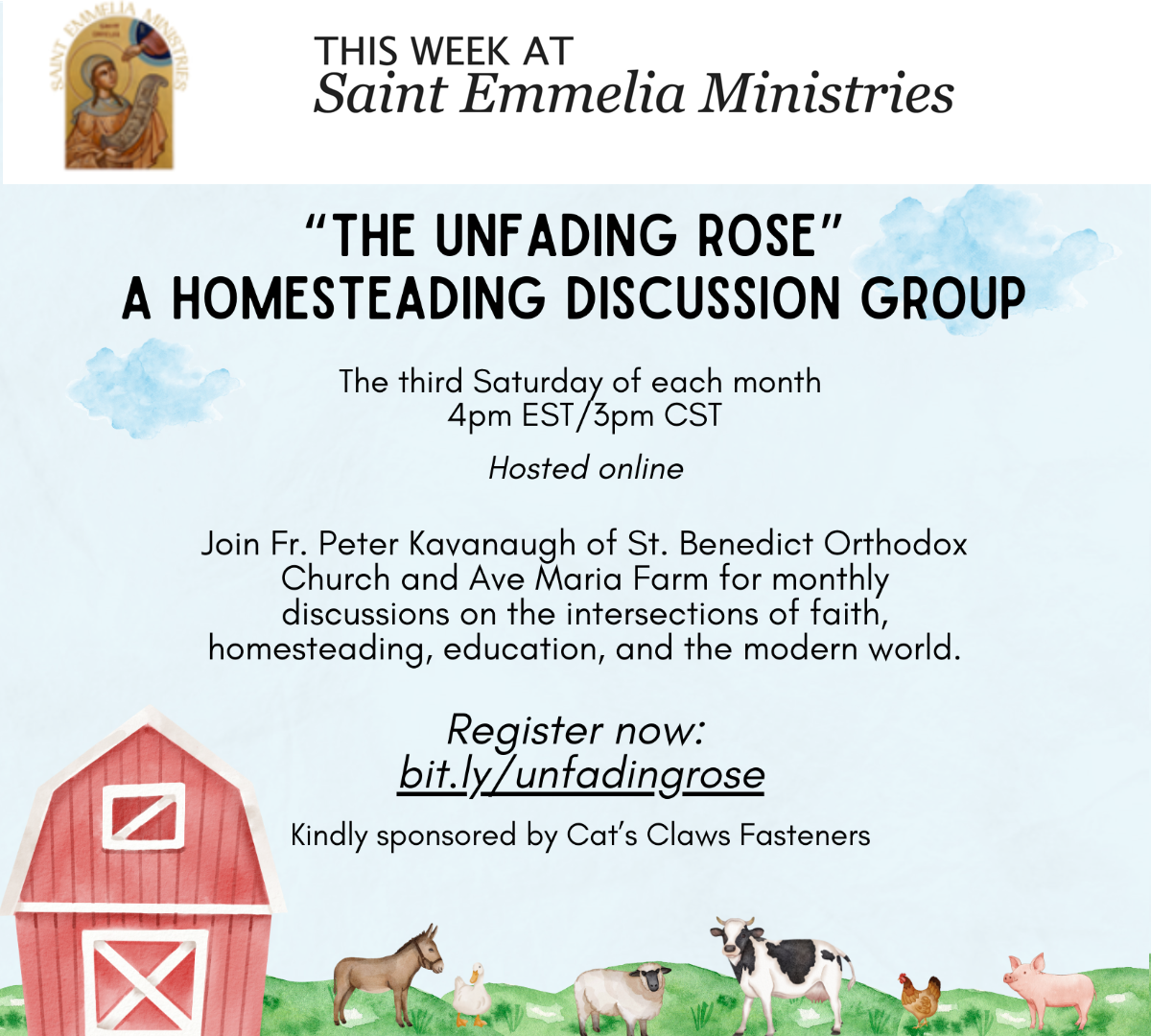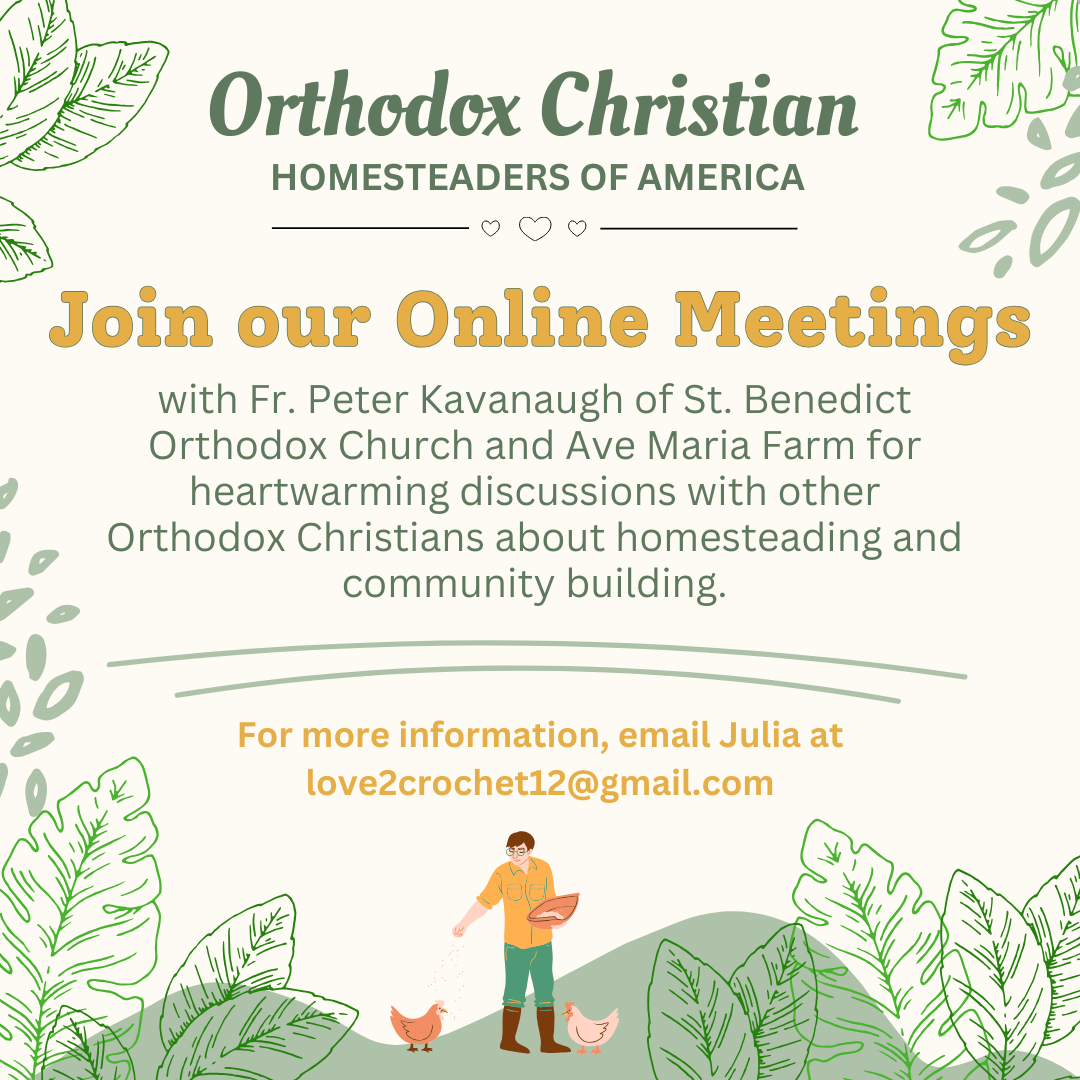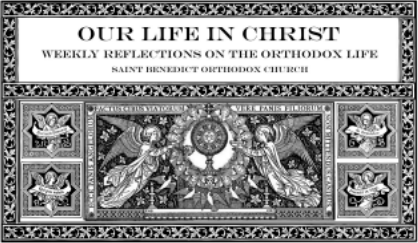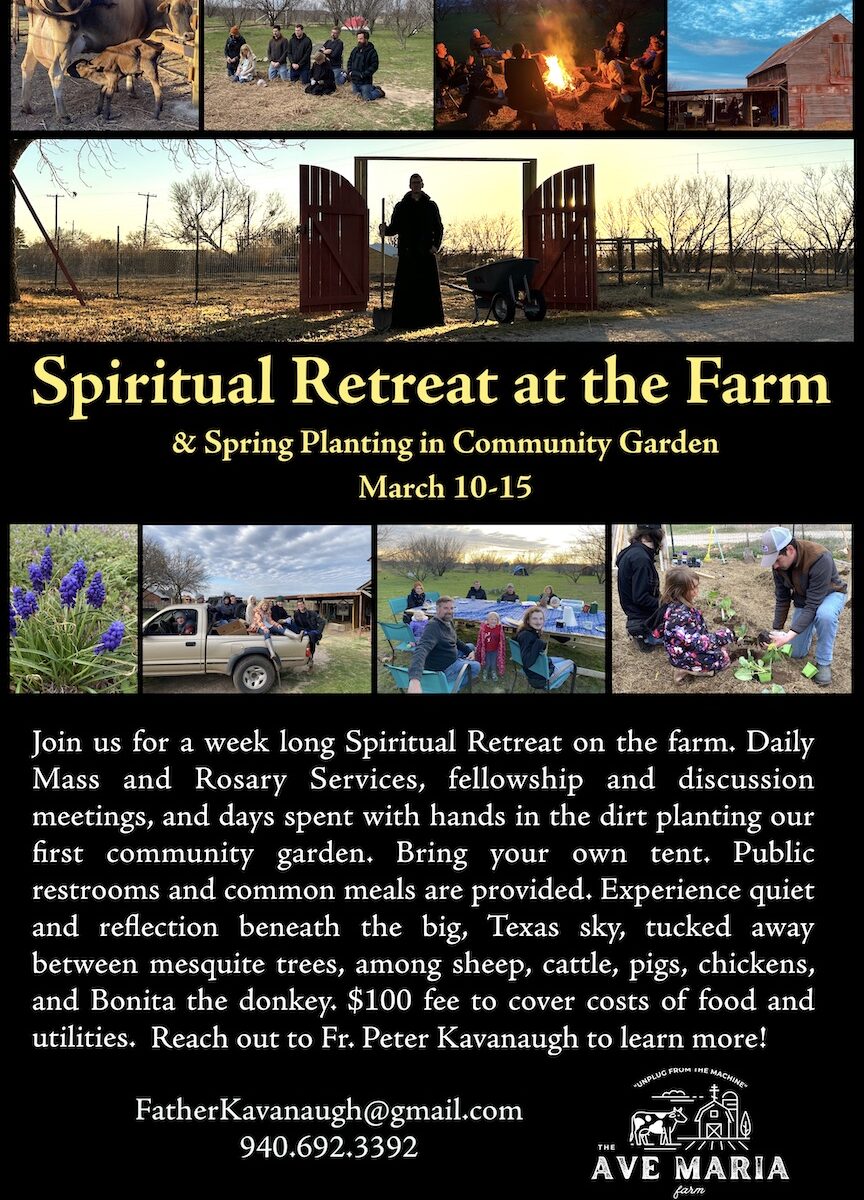In order to join, please contact: office@saintemmelia.com
Orthodox Christian Homesteaders of America
Enlightenment in the Day to Day: Marriage and Family
Reflections on Prayer
“Forsaking the vanity of many, and their false doctrines, let us return
to the word which has been handed down to us from the beginning,
watching in prayer, persevering in fasting, beseeching in our
supplications the all-seeing God not to lead us into temptation.”
~ St. Polycarp, 2nd century
Reflections on the Sacrament of Confession
“It is necessary to confess our sins to those to whom the dispensation
of God’s mysteries is entrusted.” ~ St. Basil the Great, 4th century
“How very good and pleasant it is when kindred live together in unity!” (Ps 132.1).
Marriage: A Sacred Tonsuring
The sole purpose of marriage and family is the pursuit of the Kingdom
of God. The decision to marry is little different than the decision to
become a monk. It is a sacred vow to pursue holiness and divine love
within a sacrificial relationship, calling us to the pursuit of unceasing
prayer and purity of heart.
“A wedding is to life in the world what a tonsuring is to the life of a
monk. It finalizes a decision and celebrates a call to a particular way of
seeking the kingdom of God” (Opperwall 91).
Enlightenment in the Day to Day: Love and Anger
Reflections on Prayer
“Those who have truly decided to serve the Lord God should practice
the remembrance of God and uninterrupted prayer to Jesus Christ,
mentally saying: Lord Jesus Christ, Son of God, have mercy on me, a
sinner.” ~ St. Seraphim of Sarov
Reflections on the Sacrament of Confession
“[Regarding confession] some flee from this work as being an
exposure of themselves, or they put it off from day to day. I presume
they are more mindful of modesty than of salvation, like those who
contract a disease in the more shameful parts of the body and shun
making themselves known to the physicians; and thus they perish
along with their own bashfulness” ~ Tertullian
We Work Out Our Salvation in Community
Salvation is primarily worked out in our relationships with
others. Our interaction with our spouse, children, fellow
parishioners, boss, co-workers, waitresses, and each and every
person we encounter in the day — this is where we fine tune our
soul. In every scenario, our task is straightforward: to cultivate
love and assuage anger.
Enlightenment in the Day to Day: The Goal and Telos
Reflections on Prayer
“Put away doubting from you, and do not hesitate to ask of the Lord,
saying to yourself, “How can I ask of the Lord and receive from him,
since I have sinned so much against him?” ~ Hermas, c. AD 170
Reflections on the Sacrament of Confession
“Confess your sins in church, and do not go up to your prayer with an
evil conscience. This is the way of life. . . . On the Lord’s Day gather
together, break bread, and give thanks, after confessing your
transgressions so that your sacrifice may be pure.”
~ Didache 4:14, 14:1, c. A.D. 70
PURSUING ENLIGHTENMENT IN THE DAY TO DAY
THE GOAL AND TELOS
+
How Can We Achieve Enlightenment within the World?
“How, we might ask, can a married person learn about chastity from
ancient celibates? How can a wealthy person in the world learn about
charity from people who owned nothing? How can a construction
worker learn about fasting from people who ate little more than a
biscuit every day?” (Daniel G Opperwall, A Layman in the Desert 11).
Want to Start Your Own Farm?
“If several families, sharing this humble secret, buy old houses on the same slum block and fix them up, they will have restored a kind of Auburn right in the midst of their ruined city and begun the restoration of that ordinary, healthy, human thing, the neighborhood” (John Senior, Restoration of Christian Culture).
Greetings friends!
As you know, we have been gradually building an Orthodox community out here in Northern Texas centered around our parish life and homesteading. It may be far out, but one of my dreams has been to see our neighborhood bought up by friends and family — a sort of American, Orthodox village, if you will. Well, I just noticed a post that a beautiful little farm home and 5 acre lot – lovely setting just around the corner — just went on sell. Anyone interested? Shoot me an email: FatherKavanaugh@gmail.com
“It is time to go back to those conditions in which human beings can grow again… Simplify, as Thoreau said, not by changing governments — a change of collars on a dirty neck; not by denouncing IBM, Communism, the Catholic hierarchy, the Rosicrucians and Jews; but in a single, honest, unremembered act, as Wordsworth said, of kindness and of love. As the first significant act in the change of heart, really — not symbolically — smash the television set, then sit down by the fire with the family and perhaps some friends and just converse; talk alone, even one night a week, will cut your use of energy, and love will grow. Don’t force its growth. The hearth, like good soil, does its work invisibly, in secret, and slowly. After a long time beneath the hearth of a quiet family life, green shoots of vigorous poverty appear; you have become, in a small way, poor” (John Senior).
COMMUNITY HOG BUTCHERING – This Weekend!
What every church should be doing. Come join us this weekend! Enjoy the good life, and good eating!

Reflections on our Farm Retreat: March 10-15
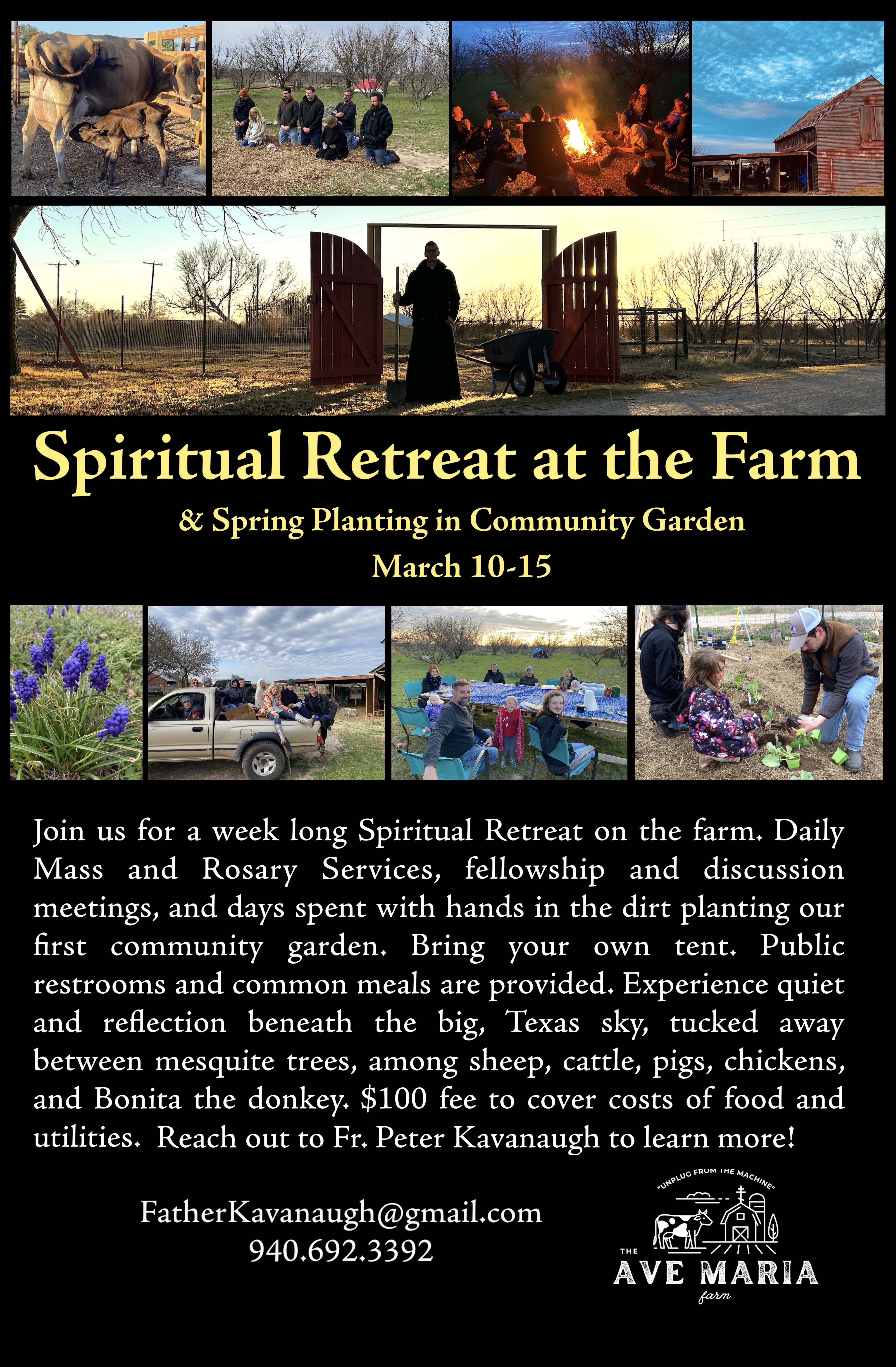
Ora et Labora:
Memories from Last Year’s Retreat at the Farm
“The soil is the great connector of lives, the source and destination of all. It is the healer and restorer” (Wendell Berry).
The day began with Mass in the biting cold, the moon above us, and the cattle lowing outside the chapel. It was peaceful…and wild. After a warming cup of coffee, we gathered by the barn to feed the pigs, tend to the sheep, and gather eggs. The day carried on as adults and children together worked the dirt, pausing only to pray the Angelus, heads bowed, and hearts focused on Our Blessed Lady. After work was done, it was time for Compline, and at last a refreshing meal by the flickering camp fire. Time changes when you spend consecutive days under the open sky. Eternity penetrates mundanity. The earth is charged with wonder.
Continue reading “Reflections on our Farm Retreat: March 10-15”Join us! Spiritual Retreat at Farm!
Greetings! We are gearing up for our second Spring Retreat and Community Garden Planting at the Ave Maria Farm. If you are interested in attending please reach out by email: Father Kavanaugh@gmail.com
This will be an opportunity for prayer, fellowship, and hard work as we plant our community garden — putting St. Benedict’s philosophy to practice: Ora et Labora! Please feel welcome to participate in whatever manner you are comfortable and reach out if you have questions. Here is the itinerary and a few matters to help you prepare and have a great time.
Continue reading “Join us! Spiritual Retreat at Farm!”Cold Showers and Quality of Life
“While everybody was asleep, an enemy came and sowed weeds” (Matthew 13:25).
Prayer. Asceticism. Fraternity.
A few weeks ago, I overheard a conversation between two men discussing cold showers. It immediately peaked my interest. I had the idea once, and, after a 5 second trial jettisoned it as fast as you can cry ‘help’! For some months now, these men had formed the habit of taking daily showers in glacial temperatures. There are a lot of benefits, they told me. It increases metabolism, improves blood circulation, burns fat and glucose, lowers stress, and gives you a dopamine kick that far out rivals an extra large coffee.
Continue reading “Cold Showers and Quality of Life”